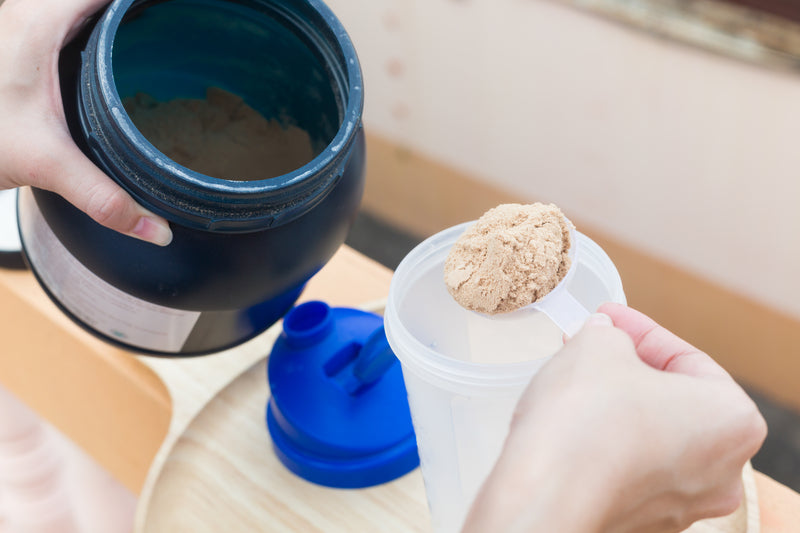Does Whey Protein Cause Hair Loss?
Protein is one of the most important nutrients needed by our body. When trying to build muscle, it becomes even more essential.
Any person who is trying to build muscle would know that whey protein is the most commonly found type of protein in the market.
| Quick Summary |
| No, whey protein does not directly cause hair loss. It's a nutritious supplement that supports muscle growth and overall health. |
Is Whey Protein a Potential Factor Behind Hair Loss?
However, whether whey protein causes hair loss has been a topic of debate.
The trend of consuming protein supplements, such as protein shakes, tablets, powders, etc., has increased.
However, it must be remembered consuming something too much is almost always dangerous, and as such, some people complain of a side-effect of whey protein which is hair loss or hair fall.
Before we delve any further into discussing this claim, we must know some of the benefits of Whey protein:
- Aids in muscle growth
As already mentioned before, people wishing to build more muscle in their bodies often take whey protein supplements to fasten the process.
This is so effective because it is rich in a branched-chain amino acid named leucine. Whey protein helps the human body to prevent muscle loss that comes with old age.
- Helps to protect the body against antioxidants
Glutathione is an antioxidant produced by our bodies. Its production depends on amino acids like cysteine, whose production is sometimes limited.
That is why consuming whey protein rich in cysteine can protect the body against antioxidants.
- Whey protein also helps in weight loss and easy digestion
It is an easily digestible protein and also betters the body’s metabolism.
What Is Whey Protein’s Connection to Hair?
For a head full of healthy hair, protein intake is really important. The very hair follicles in our head are mostly made up of proteins.
In women, a high level of testosterone may lead to hair thinning and gradual receding of the hairline, but this condition can be handled by therapy to regulate testosterone levels.
In men, the most common problem is pattern balding of the head by slowly increasing hair loss.
A 2017 study concluded that whey protein isolate might be a factor behind this. The truth, however, is that there is a lack of acute scientific data to back this claim.
Because in some cases, whey protein supplement intake has been shown to have accelerated hair growth. In some cases, genetic factors also play a huge role in this context.
If we are to look at statistics, then more men go bald than women, and it can be traced back to their genes.
In fact, according to some data, genes may play a larger role in causing hair loss than whey protein or any nutrient for that matter.
So, Does Whey Protein Cause Hair Loss?
The sudden thinning of hair after starting intake of whey protein will naturally lead one to think that this nutrient is causing their hair loss, but there is practically no scientifically proven evidence to definitively state that.
Consuming whey protein causes quite a number of changes in one’s body’s regular functioning.
Coupled with other factors, such as an overall bad diet or taking too much protein might actually lead to adverse side-effects such as hair loss.
In essence, having whey protein supplements shouldn’t be the only factor you should consider; your diet and metabolism in general also play a role here.
Should You Stop Taking Whey Protein?
There is no one answer to this. Depending on one’s condition, they can decide to either start or stop consuming whey protein. People with a past history of having hair loss issues should ideally refrain from taking it.
In general, protein is medically prescribed for many health issues and is also said to boost hair growth. It, however, should be taken in a prescribed way to avoid side effects.
Conclusion:
Until the definite answer is scientifically found, here’s what you can do instead to reduce hair loss:
-
See a dermatologist and get yourself a diagnosis. Hopefully, a hair loss treatment will be helpful.
-
Start using a different type of protein. There are many other types, such as pea, soy, casein, rice, etc. All of them have their own nutritional benefits.
-
Consider taking whey protein concentrate instead of isolate.
Choosing supplements must be done carefully, and if you are not an expert, then you should follow the advice of a professional dietician who will prescribe to you and guide you completely.
Creatinine is one supplement that can be taken instead of whey protein.
It is best to remember that all bodies are different and how they take or react to these nutrients are also different.
So, following professional opinion and avoiding excessive intake of whey protein are two of the things that you do.

